Bellator's A.J. McKee, Father Guided to Change the Sport
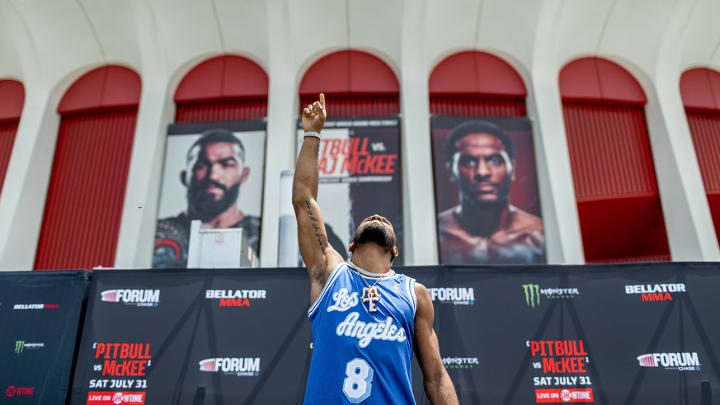
LOS ANGELES — The gym evokes a classic Venice Beach vibe. There are no necks in sight but numerous biceps that are bigger than baseballs. There’s someone lifting in head-to-toe neon with a helmet/mask combo atop their head. The doors lift like garages and are flung wide open, giving the massive space an open-air feel.
And the barbells. Good lord, this collection of barbells, thousands sitting stacked or being raised next to signs that scream things like: TONIGHT WE SQUAT IN HELL. It’s the kind of place that no normal, reasonable person would work out in, lest they risk embarrassment standing near the ripped and the giant, the soundtrack essentially a symphony of grunts.
In the center of the room, there’s a steel cage, the space where a father and son who long ago gave up on “normal” prepare for a $1 million mixed martial arts fight. A.J. McKee is stretching one afternoon in July, assisted by his pops, Antonio. He’s 51, a trainer and yet not done fighting, inside or outside the cage. “Why are you so f------ aggressive?” A.J. asks, laughing, as dad digs into his shoulder blades.
Antonio pushes deeper, then both commence with a workout that’s so f------ aggressive it’s painful to watch. A.J., 26, heeds most of the instructions, before pivoting, near the end, into a question for his father. “Why are you always making s--- up?”
“S---,” Antonio says, “I wish I knew a dude who kept making s--- up and made me 17–0. I’d be like, Sign me right now!”
Younger McKee shrugs. “You right about that, playa,” he says.
Anyone who spends even a few hours inside this orbit will come to consider, understand and be perplexed by a duo unlike any in combat sports. A.J. is 17–0 in his Bellator career, and he will clash with Patrício “Pitbull” Freire, billed often as the top fighter in company history, on Saturday at The Forum for a featherweight belt awarded to the winner of a two-year tournament—and that seven-figure purse.
Even then, father and son see a larger prize in play, if all goes according to plan. Their dream is big, improbable, ambitious: to change an entire sport.
Antonio segues into an internal voice that he says talks to him. The one that steered him away from a dangerous childhood—guns, drugs, shootouts, straitjackets—all the way to the UFC. The one that sent him to the church that changed his life. The one that told him not to visit Brazil on the same trip when a traveling companion ended up shot in the stomach. And the one that pushed him to push A.J.—push, perhaps, an Everest-sized understatement—to bolster a family legacy and make right long-ago and more recent wrongs.
Speaking of internal spirits, A.J. wrote himself a million-dollar check at age 12. He never cashed it. Should he win, next month, he will. He’ll put part of the influx toward the gym he’s building in Garden Grove, maybe buy a Ducati motorcycle or add another sports car to his need-for-speed collection. The workout ends. Antonio gives a cameraman a back adjustment. A.J. collapses. When someone asks how he recovers from that kind of workout, he shakes his head. You don’t. Not with Sycho—a combination of “sickening” and “psycho,” which is how he sometimes refers to his pops. Antonio giggles. He’s focused on the voice.
“I really believe there’s a spiritual side to this,” the elder McKee says. “The more you open yourself up, the more vulnerable you are to it. A lot of people do it with drugs.
“Me? I heard the blueprint.”

A.J. understands the sentiment. He used to tell his dad he could read other people’s thoughts, often simply by studying them. “He’s like me, come to find out,” Antonio says. “It’s a gift, and it correlated to his fighting.”
The McKees are eating outside at a fish restaurant in Long Beach that same day in July. As the elder complains about the kombucha he purchased, the younger picks up the conversation thread. The voice sometimes takes over inside the cage. “As soon as that door closes, my mind goes blank, which is weird, because I’m scared of the person that’s in there,” he says. “But I’m still analyzing everything my opponent does, from their posture to their footwork to how they’re moving to where their eyes are looking. Then I listen.” It’s hard to explain, he says. Almost like an out-of-body experience.
“I can show you a picture,” he adds, scanning through the images on his cellphone, then holding up one that shows him fighting, winning, but with a vacant expression across his face. It’s like he’s totally there and also not.
Antonio had long deployed many unusual—some might say abusive—methods to teach his boy how to channel adrenaline and handle stress. This wasn’t out-of-school homework. Or extra chores. Oh, no. The elder McKee taught A.J. to “manage stress levels so high, they’re like near-death experiences.” There is photo and video proof: of Antonio waking up a young A.J. with arm bars and choke holds, of A.J. being roused in the predawn with both arms tied behind his back. Other times, when the boy would swim, his father would sneak up from behind, shove the kid’s face underwater and hold him down, so that he might understand what it felt like to drown. “Not every child should experience this,” Antonio says, in an accurate understatement.
But that’s where A.J. believes his own voice came from. He lays out an example from two years ago, when he fought Georgi Karakhanyan and decided he wanted to beat the record for fastest-ever Bellator knockout. It stood at six seconds.
“I’m gonna break it down,” A.J. says at the table.
He comes out southpaw, so, O.K., he’s nervous. He’s trying to throw me off by doing something different. Bell rings. Touch gloves. I throw a long jab, boom, then he switches back to orthodox. O.K., well, let me back up. Get him to switch back to southpaw. Get him comfortable again. He does. O.K., already know where he’s gonna go. He’s gonna switch back to his comfortable state, orthodox. This time, instead of the jab, I throw an overhand left. Connect. He feels the power, and he’s gonna reach, and the second he gets desperate, he’s gonna regret that.
All of this happened in eight seconds. But to A.J., it unfolded in slow motion.
“Still, to this day, I don’t know how good I am,” he says. “Every fight, something new.”
He knows exactly where that started, too: the blueprint.
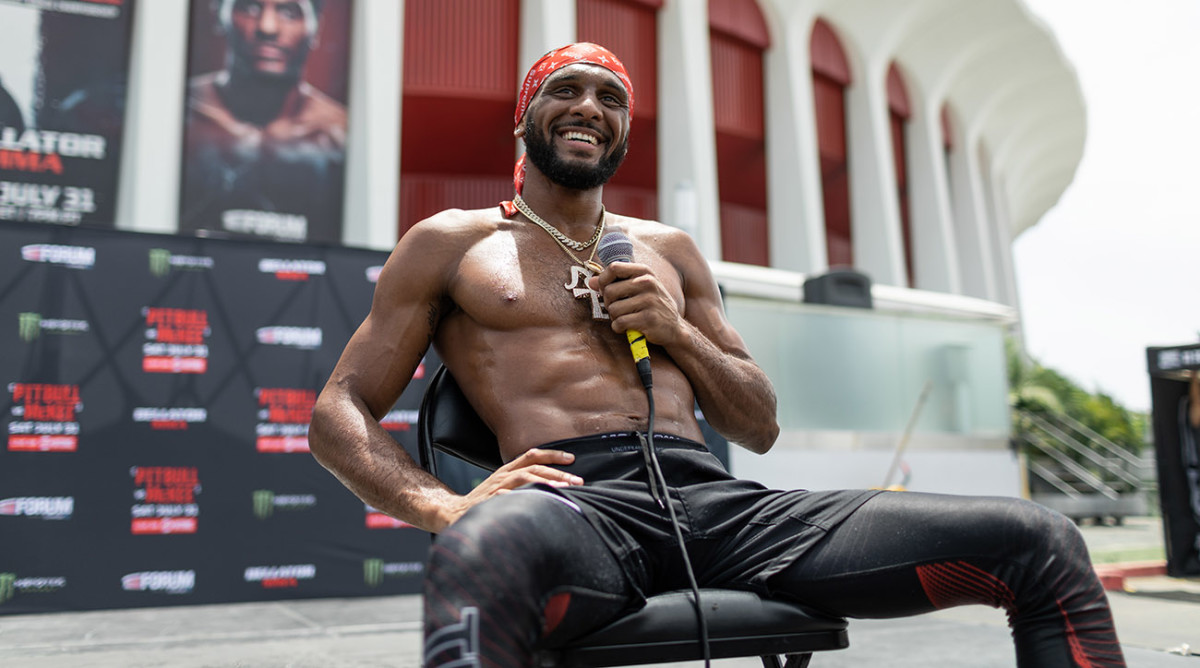
While A.J. conducts an interview with the camera crew, Antonio stands outside, unfazed by the tyrannical summer heat. He’s surrounded by several fighters he trains, and he comes across like a combination of older brother, master s--- talker and MMA philosopher. He begins to tell his own story, right away, and unless you’ve met him, heard the details, many less-than-flattering, it’s almost impossible to believe.
“It all started the day I slid out of the … [womb],” he says, using another word entirely. “Actually I didn’t slide out. I came out of that motha swinging.”
Antonio grew up in Nashville, in a neighborhood he describes as “the projects,” where “I saw so much death, killing, that at a young age it desensitized me.”
This took place even in his own home, where Antonio says he was molested as a child. And where one night, his father went to drop him off at his grandmother’s house. Dad had been drinking, as had grandpa, and an argument ensued. Since both men carried .357 Magnums—a family staple—they had a duel. Both shot, according to Antonio, and his grandfather died from the bullet wound, while his father was hit just below the waist but survived.
Events like these led to more than one stint in a state hospital for troubled adolescents and several others in jail that lasted, Antonio says, from ages 5 to 16. He can remember waking up in the facility in a straitjacket, being force-fed medication, feeling an urge to stab the orderly.
Even then, Antonio was bright enough to gain entry into a magnet school for gifted students. But because of where he came from, he never felt accepted there. So he left. He says his family lived on government assistance, which didn’t work for him, so he began selling drugs—never using, he says—at 12. One day, a mentor told him not to go to work, because of a funny feeling the house they worked out of would be busted. It was. That day.
Antonio is careful to avoid using names of people who are still alive, or to admit to crimes he “may or may not” have committed with any specificity. He says he can cop to selling guns, because, he laughs “they might be water guns.”
Eventually, the mentor attempted to set him straight. “Listen, you know you got a gift,” Antonio says the man told him. “I don’t know what it is. I want you to figure out what you want to do.”
The question led Antonio to a boxing gym, a space once used by Muhammad Ali and Sonny Liston. The adults wouldn’t let Antonio fight, but he learned the basics and one day a man approached him at a bus stop, admiring the boxing gear, and told him he should give wrestling a try. He did, and it went poorly at first—“just got my ass handed to me.” A year later, he was the best wrestler in the state. A year after that, he went undefeated. “But in that process, I did a lot of bad things,” he says.
He never started a fight, Antonio says, but he finished plenty of them. A beloved uncle was murdered in the streets; his mom, he says, was abused by the father of another half sibling. He saw relatives strung out on drugs, relatives selling drugs. “You know, I’m so used to talking about this,” he says. “But it was dark.”
Closely observing the local gangsters helped Antonio decide to change. They didn’t have retirement benefits or pension plans. They didn’t have savings accounts. Their life spans were incredibly short. They died in shootouts with police officers. “You guys are stupid,” he says he told them. And while he never joined a gang, when he heard members were looking for him, fed up, he says, with his disrespect, he went to the park where they hung out and lifted his shirt to reveal the strap tucked into his waistband. “I was that guy,” he says, plainly but not proudly. “I think I’m ready to show out today. I’m ready to die.”
In the early 1990s, three years before A.J. would be born in ’95, Antonio says he “went to a dark place.” Even after he laid eyes on the baby boy that would change his life, he says, “I’m thinking about clocking out on him. You don’t have a mom; you don’t have a dad; you don’t have no real friends. You don’t have no family in California [where he had moved]. You’re by yourself, and you’re hurting.”
He asked himself: What are your options?
A.J. gave him clarity, someone to strive for. That crystallized in one moment, when the boy, just a toddler, told him not to leave the house one night, saying he wanted to go with him. “Daddy, if you die,” A.J. said, “can I die with you?”
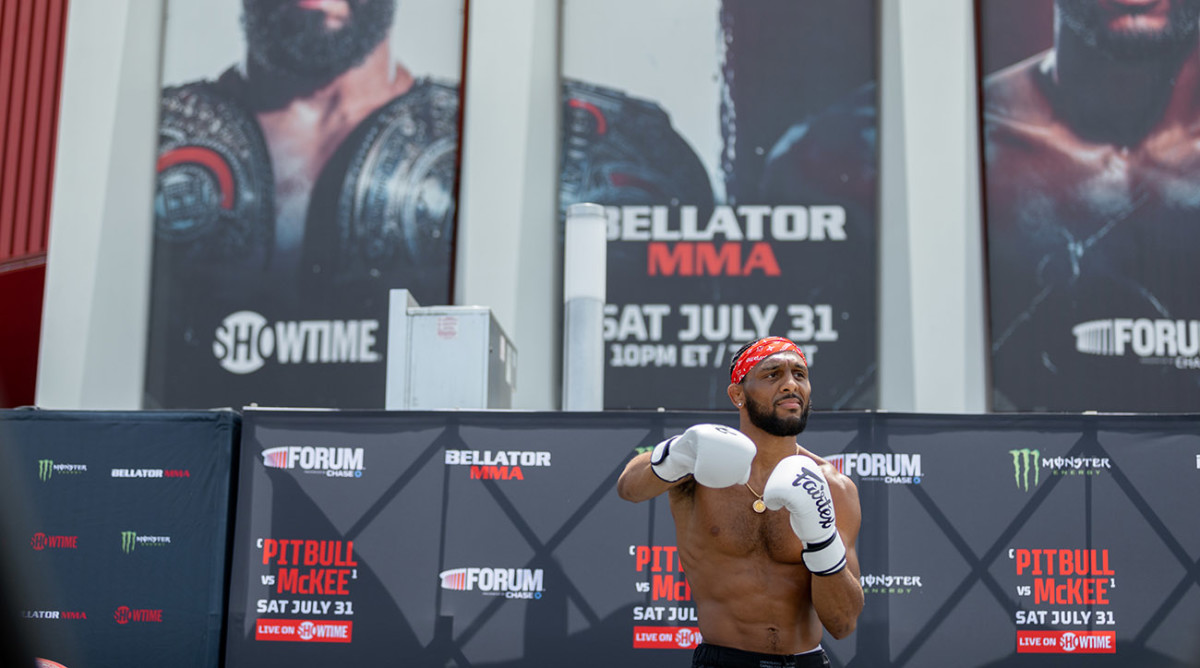
That boy, though. A.J. reminded his father of a “rainbow,” with one Russian grandmother whose family moved there from Turkey and the Black relatives they shared. Because he wanted better for his son, he set about “learning how to be a decent human being.” Because he wanted to send A.J. to private school, they settled first into a small room in a pager shop, where Antonio bathed A.J. in a crockpot until they could move into a one-bedroom in Long Beach. Every dollar he earned that didn’t go to rent or food, Antonio put toward a school that cost $540 a month.
He taught his son how to navigate the America he knew—“a racist-ass, redneck society” where not all white people were evil and not all police officers wanted to shoot Blacks. But there were enough of both that he started diving into history, politics, religion; he was trying to build for A.J. the kind of informed worldview once unavailable to him.
Eventually, he went to church, saw a white light, started crying and speaking in a language he didn’t recognize. He got baptized, and he says these events gave him clarity but not in the peaceful sense. It was time to fight.
Given his varied combat background, Antonio became a mixed martial artist before most in the U.S. knew what that term meant. In the 15 years before his first retirement in 2014, he compiled a 29–6 record and fought once in the UFC. Reports from that time describe him as conservative fighter who preferred grappling, which is hard to believe, given his stories. Still, he mentored and trained with icons in their early days, right before the sport took off, scrapping with Quinton “Rampage” Jackson and Chuck Liddell, among others.
Ultimately, Antonio portrays mixed martial arts as a sport—and the UFC in particular—as less-than-accepting of Black fighters. He says he missed out on big paydays because of his skin color, that officials and promoters wanted Black combatants to be villains, and that he played into that role in a way that later impacted the perception of his son. He asks how many Black champions fought in the UFC—leaving out some notable examples, like Rampage—and says years ago he publicly called its president, Dana White, “the new slave master.”
“I understand the financial strategy,” he says. “I understand we’re playing a different game.”
For years, then, Antonio urged A.J. not to fight—for the reasons he articulates. “It’s not set up for you to make it,” he told his son.
The younger McKee says he watched his father “beat up” Randy Couture in sparring sessions. But then they would stop by Rampage’s house, this palace with pools that even had waterfalls and massive garages filled with sports cars. “Why don’t we have that?” A.J. would ask, breaking his dad’s heart a little more each time. But A.J. didn’t blame Antonio. “I knew he deserved that [life],” the son says. “I finally realized that’s why he didn’t want me involved in the sport. But it just gave me more reason to.”
A.J. didn’t simply want to fight. He needed to fight better than his father did, go further than his father did. He knew that from “Day One.” He knew that when Antonio took A.J. and his friends to houses owned by other MMA fighters in Southern California and all the kids lined up. Whoever looked similar in size fought for $5, bragging rights and one ice cream from the truck. By 8, A.J. was hitting heavy bags next to Rampage and Liddell. Another time, A.J. watched his father get into a “scuffle” with an MMA pro named Emanuel Newton—at least until Rampage lifted Newton so high that his head nearly hit the ceiling, screamed at him and then power-bombed him onto the ground.
The younger McKee knew how to hustle, too, just like dad. Some things do not require instructions; they’re called genes. For one Antonio fight, A.J. recycled tickets through a scanner, he says, until he had collected something like $3,000, selling the same seat multiple times. He tried, though, to retain the best lessons from his father’s life and leave as much of the rest behind. A.J. could have a loving relationship with his dad. He could read the same books. “A sucky part about [it] is I don’t get a break,” he says, doubling over, meaning the lessons, wanted and otherwise, never end.
That’s, of course, how the blueprint is shaped.
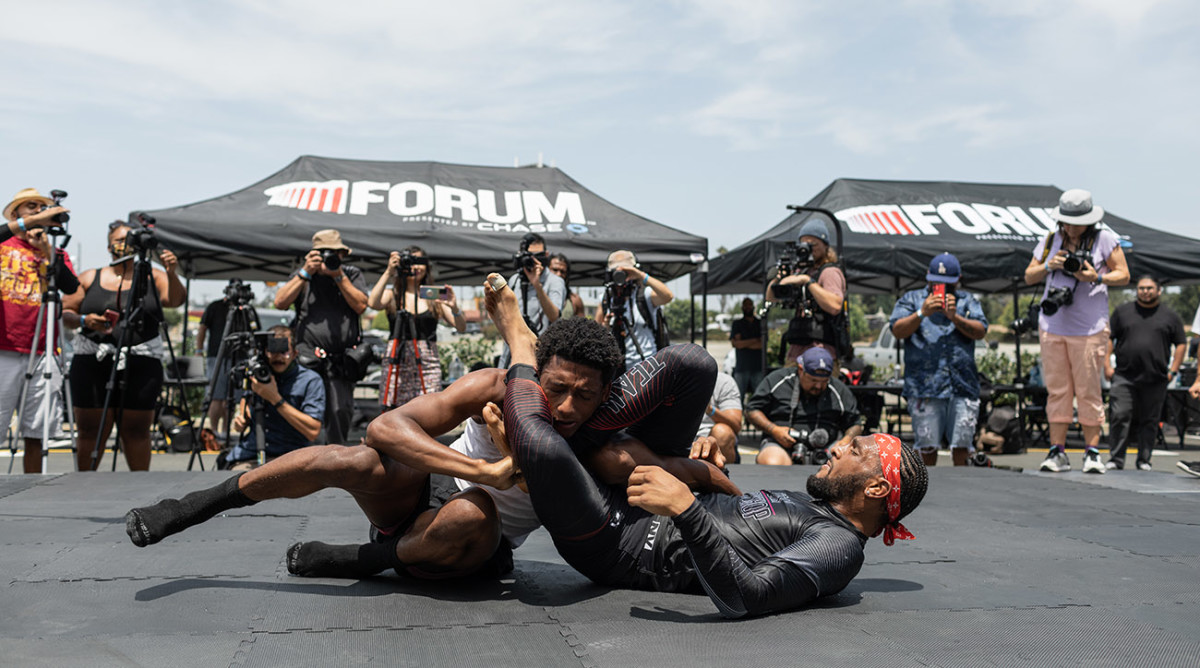
Young McKee turned pro before he could legally drink, at age 20. He debuted on Bellator. This marked a rarity, to begin a pro career, that young, with a major MMA force. Boring this McKee was not. He won most every fight by submission or knockout, registering all but five victories by rear naked chokes, punches, submissions, arm bars, neck cranks and something called an anaconda choke. His 12 stoppages now rank as the second-most in Bellator history. He beat established veterans, other prospects, even former champions.
Eventually, he admits that such dominance, with months between bouts that often lasted only a handful of minutes, grew boring. Avenging his last name only motivated him at first. “Don’t be that way,” Antonio told him, “we’re gonna get our respect.”
Stay with the blueprint, the elder McKee urged. Major on respect, integrity and work. Then, lean into that spirit. Don’t base choices on emotion. Choose, like that mentor in the drug game told him, who you want to be. Master you first. He started to sound like a human fortune cookie. But it worked, almost exactly as he planned.
Almost. A.J. still needed to grow up, and like most teenagers, especially ones who find success and its rewards, he cops to not always making the best decisions. He drank. He did drugs, often cocaine; perhaps, his father wonders, because his son’s ADHD had not been diagnosed. At one point, Antonio says he threatened a supplier from a cartel he cannot name, telling him, “Listen, you motherf------, this is my son. If something happens to him, I’m not a tough guy; I’m not against you. But, please, come and do me.” Kill him, he seems to be saying. “Because I told him, this big dude, otherwise I will get you.”
When he told A.J. this story, Antonio says he even turned a murder threat into a coaching lesson. “If that happens, I gave my life to make yours better,” he says he told A.J. “I expect you to make your life something to live for.” The elder McKee says he “kidnapped” his son for two weeks, got him clean. Looking back, the father believes his son was in pain, the emotional kind from not having a mother who was heavily involved in his life. A.J. is not estranged from her or anything, but he did live with Antonio, was picked up from school by Antonio, trained with Antonio, was awoken with choke holds administered by Antonio. “Once I saw him getting in trouble, I started to look at my life again,” the father says. “I realized: Damn, he’s just like me.”
A.J., once off drugs, sought adrenaline in other forms, mostly through speed. He outfitted a Honda CRX with a turbo-charged engine and 700 horsepower. Sometimes, he says he’ll be driving late at night and look down at the speedometer, only to realize it has climbed to more than 130 miles per hour. Early into Antonio’s first ride in the car, he asked his son to pull over, get out and call for another ride.
Now back, father and son believe that “when” A.J. wins the featherweight tourney, he will ascend into rare air. Become the kind of fighter who can sign with the UFC but doesn’t necessarily have to. Which brings us to another thing the father passed on to his son: the means, desire and hubris to design his own blueprint, guided by the voice inside his head.
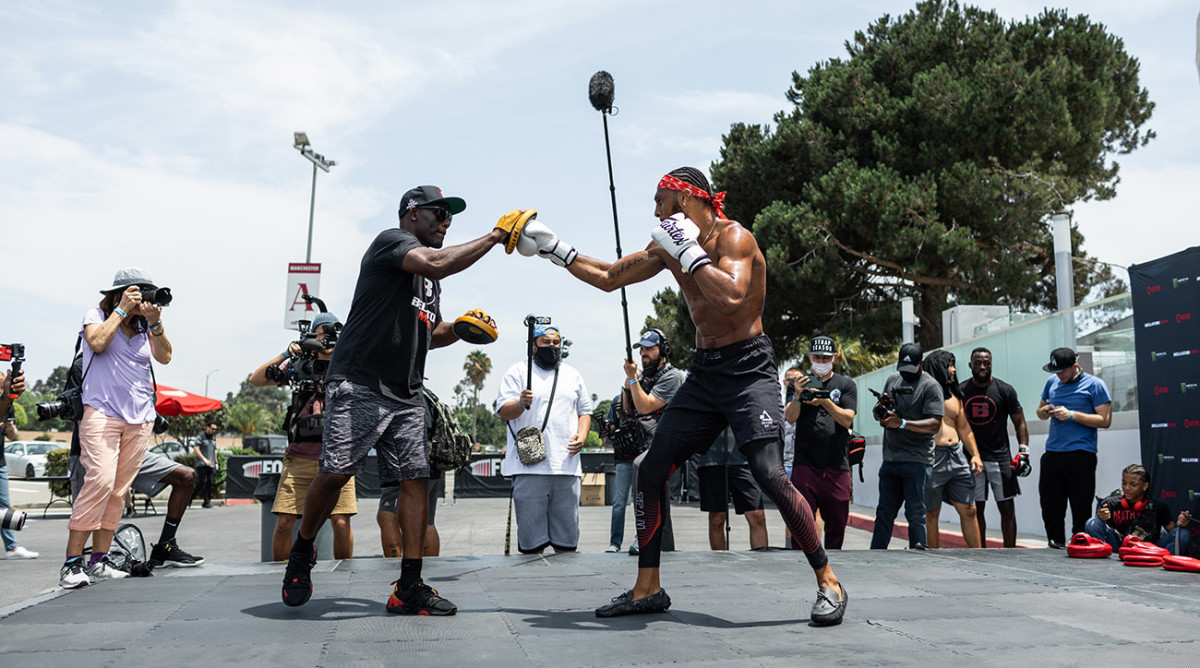
The new goal: Change the pay structure—and the options—for mixed martial artists. A.J. envisions something like what Floyd Mayweather did in boxing. “Money” May became the bank, more or less—with the help of a former Swiss banker and a longtime music executive—paying the expenses, even opponent’s purses, and raking in profits, for years, because he took a percentage of back-end gate and pay-per-view revenues. This gave Mayweather unprecedented control over his events and, thus, over his career. A.J. even went over this in a private meeting with the boxer, who urged him to do the same for MMA.
A.J. even asked Mayweather to fight him in a boxing exhibition, telling Mayweather it would be an “honor” to get knocked out by him. But Mayweather insisted that he is retired, which, of course, he has insisted before.
Mayweather told A.J. something else, something important: that promoters don’t make promotions work, but fighters do. A.J. says he would prefer not to get into the politics involved but calls MMA a “nasty world” and says “f------ fighters should make the majority of the money.” He realized that when he blew out his knee and needed surgery but planned to compete, anyway, because this was part of the tournament for the $1 million purse. Fortunately, COVID-19 canceled that match, allowing time for the procedure and recovery. He wasn’t so lucky when he fought another time with a broken hand.
A.J. believes only the rarest of combatants can force the change he seeks. He wants to add pensions for his counterparts, retirement funds that they pay into, 401(k), healthcare that lasts for the rest of their lives. He says someone like Conor McGregor had this type of opportunity—a name, a brand, belts, crossover appeal “But Conor,” he says, “is not among the best in the world. It needs to be the right person, at the right time, with the right plan, the right fights.”
To that end, A.J. plans to do boxing exhibitions either way, like McGregor did with Mayweather and would have done with Manny Pacquiao, had the MMA star not lost four of his last five bouts. He wants champs vs. champions, fighters in one promotion against fighters in other ones. (Bellator has done cards with other companies; the UFC, in general, does not.) “It won’t even be about exposing the UFC,” A.J. says. “It’s about bringing the level of equality to equal”—and not just for himself. The sentiment hangs in the air, obvious and yet unsaid. Fighters like his father. That’s what he means. He notes that transitions, the big ones, are rarely easy. “I'm probably going to ruffle a lot of feathers and piss a lot of higher-ups off,” he says. “But hey, man, it's 2021; it's time for change.”
Asked what he thinks White might make of all this, A.J. shrugs, saying they “don’t need any problems,” but that the UFC czar has “kind of ignored my name a little bit.”
Should A.J. pull off what would constitute a sea change, he plans to help his father train their fighters, first at BodyShop Fitness, then at the new location. “Bring ‘em to my little dungeon,” Antonio says. "You know what’s different? Spirit.”
What that change might ultimately look like remains complicated. For one, A.J. admits there’s language in his Bellator deal that would prevent him from becoming essentially an unrestricted MMA free agent. A.J. dreams of big bouts beyond Bellator, though, but would consider remaining with the company and doing crossover promotions with the UFC. He’d love to climb into cages with Brian Ortega or Max Holloway, to name two other stars. That would allow for unification fights like those rare mega-events in boxing where rival promoters can shelve their deep hatred for one another just long enough to host the kinds of nights that print money, hundreds of millions in some cases to spread around.
By being able to cross over, remaining the face of Bellator and taking a larger percentage of future purses, A.J. would change the model. He would live up to the license plate on that CRX, the one that officers scanned when they pulled him over for doing donuts, asking whether it was some sort of web address. AGOATJ, it reads. Of course, a fairly unlikely sequence of events must happen before his most ambitious goals become even realistic. Surely, most thought Mayweather incapable of similar, seismic changes—at least, before they happened.
Regardless, the McKee duo understands their paradigm is shifting, one way or another. They no longer swing through the old neighborhood, worried that A.J. might be kidnapped.
The voice tells him there will be commercials, even gives him ideas for sneaker campaigns, along with Rolex and Porsche ones. Tells him he needs to buy a house, since his 15-year-old brother recently moved into the apartment the family shares, because his mother could not afford anything bigger than a trailer after buying and caring for a horse. The same voice predicts that his 3-year-old brother, Antonio’s youngest son, will be a world champion by 18.
Perhaps this is all impossible, a nice, sweet narrative but not a realistic aim. Maybe the voice is like a Mayweather betting slip, posted on social media whenever there’s a major win but not for the corresponding losses. Either way, it’s difficult to listen to two men—or four voices—and still doubt them.
More From Greg Bishop:
• Joe Smith Jr.’s Boxing Future Remains Wide Open
• Why Tyson Fury Is Sports Illustrated's 2020 Fighter of the Year
• Ahead of 'The Kings,' a Look Back at SI's Coverage From Boxing's Heyday
• Ali, Frazier and the Journalist Who Befriended Them and Wrote Their Legacies
